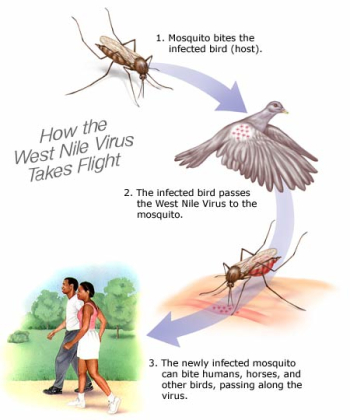 By Staff
By Staff
May 27th, 2106
BURLINGTON, ON
The pests will be back soon – mosquitos.
That bite is a quite a bit bigger than most people realize.
As part of its commitment to enhancing the health and well-being of residents through public education and preventative programs, Halton Region has begun its annual larviciding program to reduce the risk of West Nile virus (WNV) in the community. This program is implemented in public property locations across Halton Region.

This is how the West Nile virus gets transmitted.
Larviciding is the process of applying pesticides to objects such as catch basins, where mosquito larvae have been found. Larvicide is applied when other attempts at reducing mosquito breeding sites haven’t worked to minimize the risk of West Nile virus and is usually applied either in catch basins or in large bodies of standing water on public property. This preventative program reduces the adult mosquito population, helping to stop mosquitoes that can carry West Nile virus that are often found in standing water.
“West Nile virus continues to be a concern in communities across Canada which is why Halton Region remains committed to monitoring and implementing programs to prevent and protect residents against this disease,” said Halton Regional Chair Gary Carr.
“By working together with the community, we will continue to reduce the risk of West Nile virus and keep our community safe and healthy.”
“Larviciding is just one part of our West Nile virus prevention program which includes public education, monitoring and surveillance, eliminating potential mosquito breeding sites and larviciding,” said Dr. Hamidah Meghani, Halton Region Medical Officer of Health. “By eliminating standing water sites and by covering up outside at dusk and dawn and applying DEET or lcaridin, we can reduce the occurrence of West Nile virus in our communities.”
Halton residents can help reduce breeding grounds for mosquitoes by removing objects that may hold water, such as bird baths, plant pots, old toys and tires. If residents see standing water on public property, they can report it to Halton Region by emailing accesshalton@halton.ca or dialing 311.
Residents are encouraged to take the following steps to protect themselves and their families from mosquitoes:
• Cover up. Wear light-coloured, long-sleeved shirts and pants with tightly-woven fabric.
• Avoid being outdoors from early evening to morning when mosquitoes are most active and likely to bite, as well as at any time in shady, wooded areas.
• Reduce mosquito breeding sites around your home by getting rid of all water-filled containers and objects. Change the water in bird baths at least once per week.
• Use an approved insect repellent, such as one containing DEET or Icaridin.
• Make sure your window and door screens are tight and without holes, cuts or other openings.
A map showing the locations of standing water sites on public property where larvicide is applied is available at halton.ca/wnv. For more information about West Nile virus, please visit halton.ca/wnv or dial 311.















